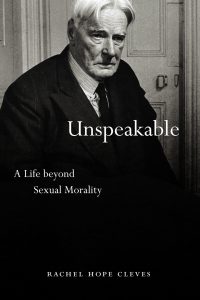Six Questions with Rachel Hope Cleves, author of “Unspeakable”
What do we do with the life of a person who was celebrated in their own time, but whose actions, violating what are now seen as firm moral and legal boundaries, appall us today? The life of once-renowned twentieth-century author Norman Douglas raises this question in a particularly stark form. In her new book, Unspeakable: A Life beyond Sexual Morality, Rachel Hope Cleves takes a clear-eyed look at Douglas’s life, what it can tell us how societal standards change with time, and what we can learn from a better understanding of those shifts. We asked her a few questions about the book.
Norman Douglas is far less famous now than he was in his lifetime. How did you first learn about him?
Believe it or not, this very serious book began with a little light vacation reading. In 2013-2014 I spent a sabbatical year in Paris with my family and we bought discount airline tickets to Naples for the kids’ spring break. A friend recommended that we visit Capri while we were there. I didn’t know anything about the island, so in my typical nerdy fashion I looked for books to read and discovered that there was a 1917 bestseller about Capri written by an author I’d never heard of named Norman Douglas. I read South Wind while we were vacationing and was totally intrigued by both its author and his portrait of the sybaritic cosmopolitan expatriate community in Capri at the turn of the twentieth century.
You frame Unspeakable as a “history of the social world of sex between men and children before the 1950s.” What do you think Douglas’ story can tell us about that larger social world?
Reading South Wind made me curious about Douglas, but discovering the contents of his archive drove me to write this book. There are plenty of forgotten authors and plenty of terrible people who don’t merit biographies. Douglas is interesting because he generated an enormous and explicit archive that captures a historic sexual culture that has been erased from popular memory. This archive includes letters and diaries written by children with whom Douglas had sexual encounters; letters and diaries of Douglas’s adult friends that describe his sexual behavior; Douglas’s own fiction, non-fiction, and correspondence describing his pederasty; and countless recollections and fictionalizations by friends and fans that seek to make sense of his life. Taken together, this archive yields a portrait of a widespread early twentieth-century subculture of men who sought and celebrated sexual relations with children.
How was Douglas’ world different from our social world today with respect to sexual morality, and how did we get from there to here?
Douglas’s life spanned the heyday of the neo-Hellenic celebration of pederasty, an idealized erotic mentorship relationship between adult men and boys. He was born in 1868, when neo-Hellenism was reaching the zenith of its popularity in British and German schools and universities. And he died in 1952, just as the discourse of pederasty was giving way to a new framework for understanding adult sexual interest in children as pedophilia. Google’s ngram viewer tool shows that the term “pedophile” did not overtake “pederast” in the corpus of English language works until the second half of the twentieth century. During Douglas’s lifetime, his sexual behavior was seen as disreputable and led to his arrest, or threatened arrest, on multiple occasions. However, pederasty was common enough that it wasn’t understood as monstrous. It was one of many disreputable sexual practices that could get you arrested, along with homosexuality and prostitution. What has changed since Douglas’s death is that the circle of tolerated sexual behaviors has grown broader, as evidenced by the decriminalization of homosexuality, and the relative anathema against sexual behaviors that aren’t tolerated has grown more intense. It may be counterintuitive to imagine that sexual liberalism could intensify the anathema on sexual practices that fall outside the boundaries of tolerance, but that is exactly what I think the history of intergenerational sex reveals.
In the aftermath of the #MeToo reckonings, there have been many conversations about the tacit permission society gives to powerful men to perpetuate sexual harassment and violence. Did writing this book give you any new insights into the relationship between celebrity and sexual abuse?
Unspeakable reveals that the ability of Jeffrey Epstein and men like him to get away with abusing children in full view is an old story. Social historians warn against mistaking prescriptive and descriptive sources. Rules are as likely to reflect what people do as what they don’t do. This is particularly true when it comes to the history of sexuality. Rules that govern sex never accurately describe people’s sexual practices. Sexual rule-breaking is common in all times and places. The question is when and how does society choose to enforce its rules. It will come as no surprise to people familiar with the stories coming out of the #MeToo movement that rules were and are enforced more severely against the powerless than against the powerful. Jeffrey Epstein did not hide his sexual relations with young teenage girls. His 2008 conviction for procuring a child for prostitution was public record. But many prominent people and institutions continued to associate with Epstein because he was a powerful man who offered access to wealth, connections, and pleasurable parties. Douglas benefited from the same privilege afforded to power. His sexual encounters with children were always public knowledge. Like Epstein, he was arrested on occasion, but he was never prosecuted the way he might have been were he not a celebrity (for example, he was given a visa to leave England while he was on bail after his 1916 arrest).
At the end of each section you have a “reflection” that contextualizes Douglas’ life and inserts your analytic voice as a historian. Why did you feel this section was important to write, and what led you to make the choice to intervene in the narrative?
I faced an enormous challenge in writing this book: how to historicize a sexual practice that is highly taboo today but was less so in the past. As Richard Yuill points out, our taboo against is now so totalizing that research about pedophilia “itself in some way undermines the very cultural taboos.” Arguing that attitudes toward sex between men and children were more forgiving in the past than in the present created the risk that readers would see my book as an apologia for child abuse. It wasn’t possible, however, to counter this misapprehension through repeated first-person interjections noting that I disapproved of child abuse. For one thing, I think that the job of the historian is to make sense of the past, not to use the past as a moral parable. Instead of just stating my disapproval of pedophilia, I needed to create space for more extended passages about the ethical and interpretive dilemmas that I faced, as a historian in researching and writing this history. After much trial and error I arrived at the solution of using “reflections” at the end of each section to engage these questions in depth. I am especially excited about this solution because I think the reflection sections, which are packed with interpretive questions, will make for stimulating classroom discussions.
To end on a lighter note, what is the best book you’ve read lately?
This is so hard! I’m a massive reader. So I’m going to talk about a few of my recent favorites in different genres. Science fiction: N. K. Jemison’s “Broken Earth” trilogy. Mystery: Ben Winter’s “The Last Policeman” trilogy. Historical fiction: Sarah Perry’s “The Essex Serpent.” Literary fiction: Richard Powers’ “The Overstory.” Classics: Norman Douglas’s South Wind (I had to throw it in there). Romance: Penny Reid’s “Winston Brothers” series. Short Stories: Ted Chiang’s “Exhalation.” Biography: Benjamin Moser’s “Sontag.” YES, I super cheated by including lots of series. So sue me. Also everything by Kate Atkinson.

Rachel Hope Cleves is professor of history at the University of Victoria.
Unspeakable is available now from our website or your favorite bookseller.
